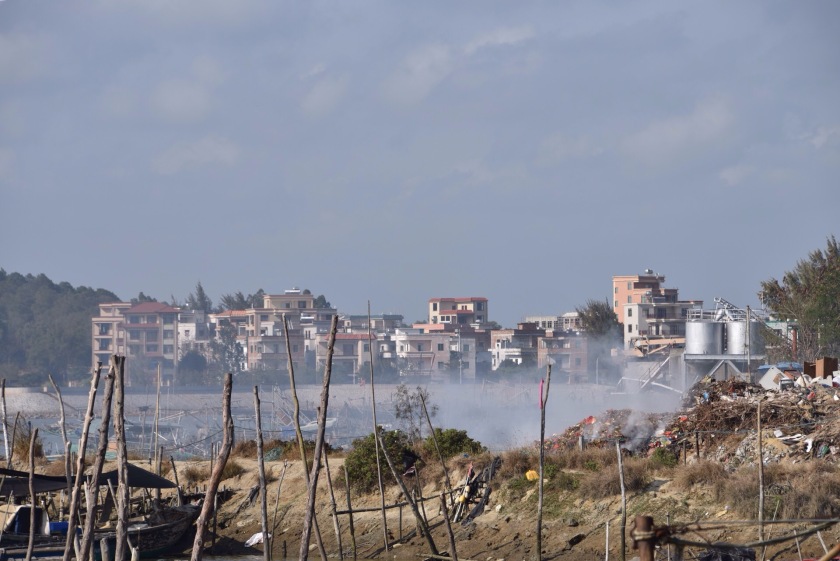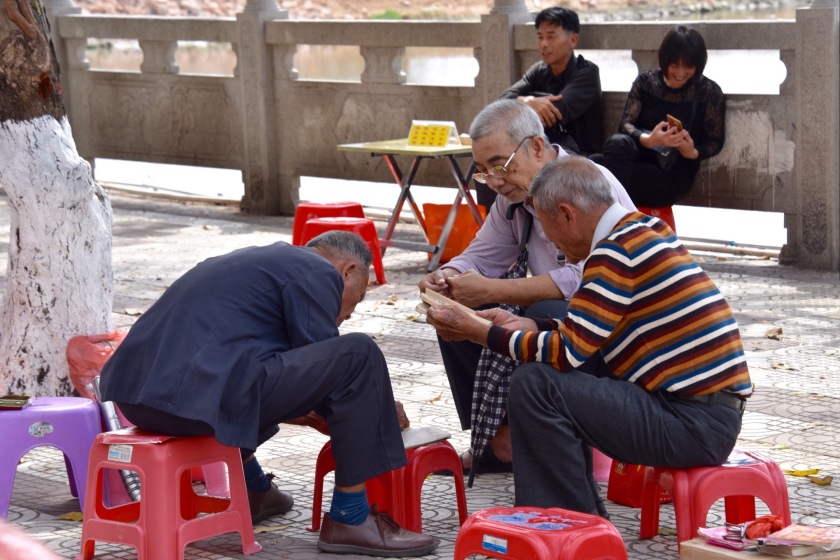
Really lonely areas are naturally rare in this densely populated country, especially where even the smaller towns are growing permanently. Of the one-child policy, China has been saying goodbye for some time, the young families need housing and even in the countryside and in the villages is being rebuilt, albeit on a smaller scale.
After I leave Wuchuan, I stay for the next few days near the coast, have two times accommodation directly by the sea, in some fairly remote places, but in Yangxi again in the middle of the city. The length of the daily routes varies between 45 and just under 70 kilometers. Because of my one day late arrival to Hainan I renounced the scheduled break in Shapa Bay, and after the meanwhile about two weeks that I am on the road now, I finally find back to my original schedule.
Even in Wuchuan fireworks can be heard from time to time during the night. Not very close to the hotel, but quite clear and it seems to be common, so always late at night to start, when tired cyclists want to sleep. It’s not as enduring as the night before in Xiashan.
This city I leave first in a northeasterly direction, want to avoid the G228 as a developed long-distance connection and drive a wide arc through the east of Wuchuan lying, again a bit more rural region.
In one of the smaller towns, I drive directly past the open market, the soup pots there is already heated properly over the gas flame, but I have a longer break for a noodle soup not before I’m in the larger city of Dianbai. The day is sunny and warm, the thermometer climbs quickly towards 26° C. Later in the afternoon it drops to just under 30° C in the shade; Values that I last had in the south of Hainan.
Dianbai is located on a large bay, almost an inland lake, which has only a relatively narrow access to the sea. The Chinese Navy operates here, among other things, a large shipyard site and on the streets at lunchtime, from time to time members of the military in their gray-blue-white camouflage or everyday uniforms are to see. But at lunchtime always many people are on the streets, doing errands or going out to eat. On a promenade on the shore of a small freshwater lake, some people are now sitting here in the shade of tall trees talking and relaxing, or playing cards, which seems to be very popular, and that strikes me again and again in other places.

I have to turn around the Bay of Dianbai completely in order to reach my todays destination in the southeast. Unfortunately, eastwards out of the city there is only the freeway, which I have to follow for a few kilometers with its unpleasant traffic, before I turn south on the edge of Danchang at a 90° angle and onto a less important side route. At the village of Xige I almost reached the eastern side of the narrow mouth of the bay. The road runs here on a dam that holds back the seawater from the abundant fishponds in this area.
On the side towards the sea, some fishing boats are lying in the water, in an improvised workshop, two men are busy to maintain or repair a boat engine. Many gear parts are distributed on the floor but rather come from earlier repairs. Nearby, a garbage dump is smoldering, the smoke following the wind to the west. So exemplary almost everywhere in public space people are busy picking up the surrounding street garbage, or sweeping leaves, so often the collected garbage is also simply ignited in the ditch.
Starting from the slightly larger spot Hengshan then leads a cul-de-sac up to the sea and the hotel, in which I had reserved a room in advance. Lying by the sea, it is a well protected property. It’s the second time after the Hai Bin Resort in Xiashan that I stay in a fenced and secured hotel area. It’s maybe because of the cooperation with a Wyndham luxury resort, that I also pass by on the driveway through the spacious grounds.
In the house, which might once have been created as a holiday home deserving party members decades ago, I get a large room equipped with a comfortable seating and otherwise a little worn furniture, in which more than just one bike would find space.
The next day I have to drive back the approximately 2 kilometer-long spur road to the next village, in order to continue my way in an easterly direction.
The hotel does not offer anything, so I just make a coffee and eat two bananas for breakfast; then start going soon. Shortly before I come to the G325 after about 12 kilometers in Mangang, I want to look for a restaurant. There should be no problem finding something edible.
Surprisingly, the small nest Hengshan at the first intersection not only has its own small post office, this post office is even open on Sundays. At least the official who had sold me some stamps the day before picks up the written postcards there at his desk.
Once again, it is cloudy in the morning and it remains the daytime rather cloudy, even if in the early afternoon from time to time the sun comes through the clouds. The clouds do not really clear up until the late afternoon. However, it will not be as warm as the day before. Due to the constant wind, it is sometimes rather unpleasantly cool.
Somebody burns some of the crop residues in a field, maybe there is also garbage, and the smoke spreads over kilometers in the landscape, causes a slightly hazy view.
Between individual villages, sometimes the area is loose covered by pine trees, without one could speak of forest. I only see larger, contiguous forests on mountain slopes in the distance, otherwise fields with corn, vegetables on smaller plots, outside the villages people also practice duck breeding here. Somewhere the already finished grilled ducks have to come here, that some of the street kitchens present fat shiny in vitrines. Apparently they are kept at larger ponds by the hundreds together in one age group. Sometimes the ducks are young, with bright plumage, probably a few weeks old, sometimes they are already fully grown, enjoy themselves on the water or rest lazily on the dry land. These ‘duck farms’, often spacious areas with a huge pond, are often right on the path, the animals can’t be disturbed by passing vehicles. But if I stop by bike at the fence that prevents the animals from disappearing and which often is low (mybe they can’t fly, because they never learnt it), then they obviously feel threatened and move in large numbers to another corner of the area.
In the city market, these animals are sometimes seen in mobile enclosures as living goods, just as little they know as they expect, like the chickens who often fumble between the street and private properties foraging. Well fed, almost too fat, they obviously lead a good life before they come into the pot. I’ve never noticed chicken farms here in Guangdong, but I saw a few in Hainan. Always under dense, shady trees, a low wooden house for the eggs and plenty of open space around it for hundreds of happy chickens who could walk around on this relatively large area as they wanted. Once upon a time, soft music came out of a loudspeaker on such a chicken farm, delicate singing to calming music, which probably did not lead to larger eggs either. Maybe it was just an attempt of a chicken breeder.
Shapa Bay is also a rather dreamy nest with some smaller hotels directly on a beach promenade, a small amusement park and a few restaurants, which, due to their size, obviously expect whole busloads of guests. Each presents its range of crustaceans and fresh sea fish in large aquariums right next to the entrance, as is evidently common in fish restaurants in southern China. You can see that sometimes even in larger cities. Only the demand is apparently low at the moment. There are only a few guests at the tables in the evening, and some of the restaurants are not even open.
But at dusk, some locals meet to dance together on a small square on the beach promenade. The music for this event comes from a somewhat desperate sounding loud speaker and gives the happy get-together a nice touch of improvisation.
So far I’ve been really lucky with the weather. It wasn’t always sunny, but I still had no real rain. This morning, however, there is a clatter on the balcony when I wake up. I don’t know how long it rained at night, when I start the next stage towards Yangxi with only light rain, then in the morning, the streets are soaking wet and there are puddles on the sometimes not very flat concrete, I don’t know, how deep they really are. First in Laifuyuan, a neighboring town of Shapa Bay about 5 kilometers away, I’m watching out for breakfast, because Shapa Bay itself died out this morning. Even the bakery where I got cake yesterday afternoon is closed.
Even though the by-road is not too far from the coast until Shangyang, the landscape gradually becomes more mountainous and forested, and the clouds hang low on the slopes long after the rain. Apparently forestry is practiced here in addition to the land and the trees are quite young, mainly eucalyptus, but isolated here are also young pines in between.
In the wide valleys, however, rice cultivation or what is left of it after the last harvest, remains dominant.
As I do not have a really long distance to Yangxi today, just under 50 kilometers, I take some time off with a longer break and slowly roll through the small but hectic city of Shangyang at noon. People come from their work in the surrounding businesses or from the fields with their mopeds to eat in the city. I’ve seen this in other cities already before. As a consequence the small restaurants are now busy, too and also many students now have a longer break as well, and they besiege tea shops or small fast food restaurants.
In the village of Shidingxin, about half an hour later, I see a small food stall next to a small two-wheeler workshop, with a delicious scent of something that initially remains hidden in the dark of the roof. A table under the canopy is free, I’m hungry now too, and the dough patties made in a large cast iron pan are now just the thing. In the meantime, even the sun comes through the clouds and quickly heats up the air again.
It is not very far to Yangxi from here. I drive into the city coming from the south, first pass one of the older suburbs, with narrow streets and older houses, before I reach the center, where the streets are as usual wide and full and I have to use the universally used secondary lane.
A young man with his racing bike, who stops behind me at a pedestrian traffic light where I have to wait, tries to get in touch with me. He’s a student who lives here in the city, as he slowly explains to me in awkward English. He is interested in my bike and takes a picture with his smartphone. He cannot accompany me for too long, after a few road crossings he turns in his direction and I continue to follow my direction.
Here in Yangxi I find a quietly located room in a small hotel in the middle of a residential area, whose small restaurants in the area I am later spoiled for choice.







